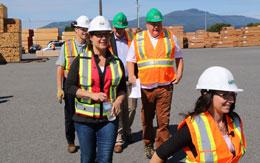Resource jobs resonate with British Columbians

Guest editorial
By Stewart Muir
City residents use British Columbia’s resource products such as natural gas on a daily basis, but how often do they stop to think about the significance of these goods in their own personal lives?
Probably not much.
On close examination, everyday resource commodities are more deeply embedded in B.C.'s ongoing prosperity than many people are aware. Decisions affecting resource priorities should be made with care because the alternatives to a healthy and responsible Canadian resource sector are not attractive ones.
Jobs are a big part of the story. So are innovation and exports. Once these factors are understood, it is easy to see why political leaders at the provincial and federal levels in Canada are so determined to stimulate healthy resource sectors.
Let’s start the story with paycheques.
The newest data for B.C. shows that a resource job pays $1,500 a week compared to the average job paying $900.
Such jobs are also the most likely to be full time, with the average worker in oil and gas or mining leading the province at 38.7 hours a week.
While it is common to hear that occupations in science and technology are outstripping the resource sector, jobs data from BC Statistics show it is actually the other way around.
In 2003 there were seven scientific-professional-technical jobs for every job in oil and gas and mining. By 2013, there were only five.
What’s going on? It’s simple: there was 51.3 per cent growth in oil-and-gas and mining employment during that time versus 25.1 per cent growth on the technical side.
Both stories are actually quite good, but the fact is that no occupation in B.C. grew as quickly as the mining and oil and gas extraction did during that decade. Only construction came close at 39 per cent growth.
Stagnating growth in tourism and retail jobs – up just three per cent and eight per cent respectively in the past decade – magnifies the important contribution of our hyper-productive resource sector.
Ten years ago there were nine tourism jobs for every oil and gas and mining job, today there are only six.
Finance, education, health care, and public administration also saw anemic growth compared to job expansion in oil and gas and mining.
Understanding the value of resource employment requires more work than just adding up the number of positions.
For example, a resource job in B.C.’s Peace region (where the natural gas is found) produces up to six times the impact on the economy of the average worker in the province, looking at it in terms of export value created.
The export value per labour force participant in Peace in 2013 was $198,500, almost six times the average of $33,700 seen throughout the rest of British Columbia.
So every time we lose (or gain) one job in the natural gas industry that’s like losing (or adding) six people in, say, a retail business.
This is what it means to have a trading economy dependent on exports and imports.
If every worker was as productive as the worker in oil and gas, British Columbia would have a GDP far in excess of the world’s richest nation, Luxembourg.
The biggest economic engine driving provincial GDP remains the region outside Metro Vancouver.
And it is why, like never before, voters need to support B.C.-ism with policies that nurture resource jobs within a dynamic broad economy.
Stewart Muir is the founding executive director of the Resource Works Society. A fuller version of this opinion piece can be found on resourceworks.com









